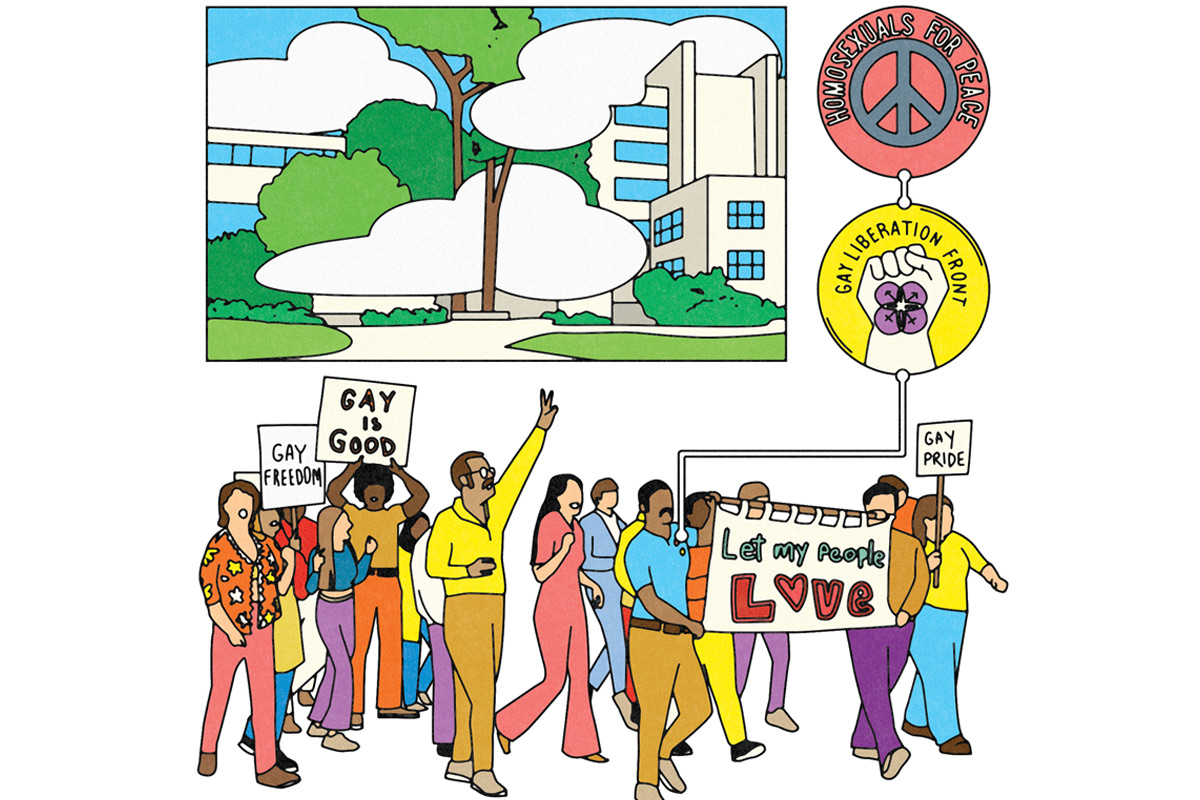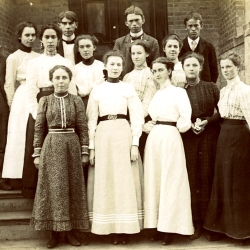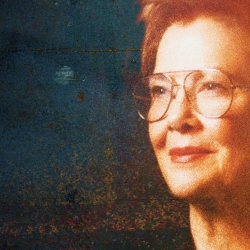
Illustration by Elena Lacey
The 1968 – 69 student strike did more than bring ethnic studies to SF State — it also ignited a wave of LGBTQ activism
By Marc Stein
Marc Stein is the Jamie and Phyllis Pasker Professor of History at SF State. He is the author of five books on LGBTQ history, the director of the OutHistory website, the co-editor of Queer Pasts and the vice president of the Organization of American Historians. Since much of this issue focuses on the past in honor of SF State’s 125th birthday, we turned to Professor Stein for insights on a sometimes overlooked chapter of University history and the Gators who made it happen.
SF State has a rich and diverse history of LGBTQ people, politics and programs, but until recently that history has not been explored in much depth. That has changed in the last few years thanks to a collaborative research project undertaken by more than 40 students in three of my recent history of sexuality classes. With the support of a Marcus Transformative Research Grant, some of that research will be shared this fall on OutHistory, an LGBTQ history website I have directed since 2023. The exhibit, launching in December, will include reprints of more than 100 media stories, many from student newspapers, along with interviews, photographs and other primary sources from the 1960s and 1970s.
Our university regularly recognizes the significance of the 1968–69 Third World Liberation Front strike, which led to the creation of the College of Ethnic Studies, but we have paid less attention to the transformative effects of women’s liberation and gay liberation on our campus in the same era. As it turns out, LGBTQ people participated in the strike and the strike inspired an upsurge in LGBTQ activism.
The upcoming OutHistory exhibit will profile SF State faculty, students and alumni who were inspired to fight for LGBTQ liberation in the late ’60s and early ’70s. Among them:
Morgan Pinney: In January 1969, Vector magazine featured an essay titled “State College from a Homosexual Perspective.” Vector was published by San Francisco’s Society for Individual Rights, one of the country’s largest gay organizations in the 1960s. Written by Pinney, an SF State Accounting instructor, the article provided a sympathetic account of the Third World Liberation Front strike and urged gay people to support it. After speaking out in favor of the strike and participating in the American Federation of Teachers strike of 1969, Pinney was fired. Later in 1969, the California Federation of Teachers adopted a groundbreaking gay rights resolution drafted by Pinney.
Gary Weinberg: In 1969, Delta Air Lines refused to allow Weinberg, an SF State student, to board a flight leaving from San Francisco, citing his “unacceptable appearance and grooming.” The company claimed that he had violated its “no sandals without socks” rule, but Weinberg suspected that the real issue was his “Homosexuals for Peace” button.
Charles Thorpe: Thorpe was one of the student founders of SF State’s Gay Liberation Front (GLF), established in March 1970. In August 1970, SF State’s GLF organized a National Student Gay Liberation Conference. Thorpe opened the conference with a fiery speech and a new battle slogan: “Blatant is beautiful.”
Betty Kaplowitz: The other student founder of SF State’s GLF, Kaplowitz later released a well-received album titled “Out and About.” My oral history interview with Kaplowitz, now living in Massachusetts, will be included in the OutHistory exhibit.
Richard Love: In a 1970 interview, Love, an SF State alum, discussed his bestselling gay novel “Song of the Loon,” published under the pseudonym Richard Amory in 1966. The book, which featured homoerotic relationships between white settlers and Native Americans, was inspired by a Spanish novel that Love read in an SF State class.
Charles Christman: In December 1970, student Charles Christman was shot by police outside the Stud, a popular Folsom Street gay bar. Hospitalized with a shattered tibia, Christman was charged with five counts of assault on a police officer with a deadly weapon (his car). After his initial trial resulted in a hung jury, Christman accepted a plea bargain.
Sally Gearhart: Gearhart began teaching at SF State in the early 1970s. Today she is best known as one of the founders of Women’s Studies at SF State, the author of the lesbian utopian novel “The Wanderground” and a chief ally of Supervisor Harvey Milk in the campaign against the anti-gay Briggs Initiative. In 1972, Gearhart taught one of SF State’s first LGBTQ studies courses, “The Rhetoric of Gay Liberation.” Other early courses taught at SF State included “Problems in American Identity” (1969), “Homosexuality and Gayness” (1971) and “Homosexuality as a Social Issue” (1972).
For those interested in learning more about the history of sexual politics at SF State and recent SF State historical projects on related topics, see:
Julie R. Enszer, “Sally: A 2023 Interview with Documentary Filmmaker Deborah Craig” and the “Sally” website: https://www.sallygearhartfilm.com/
Betty Kaplowitz, “One Step Up…,” Devils Gate Advocate, 23 July 2023, https://devilsgateadvocate.com/2023/07/23/one-step-up/.
Marc Stein (SF State History professor), “Teaching and Researching the History of Sexual Politics at San Francisco State, 1969-1970,” California History 98.4 (Winter 2021): 2-29, https://doi.org/10.1525/ch.2021.98.4.2
Ruth Truman (M.A., History, ’23), “Priscilla Prude and the Lusting Lout: The Sexual Revolution versus the Regulation of Women’s Sexuality at San Francisco State, 1969-1972,” Ex Post Facto 33 (Spring 2024): 9-25.
Features

125 Years of SF State Excellence
SF State’s motto translates to “experience teaches,” so after a century and a quarter we’ve got a lot of fun facts to school you about.

I, Alli Gator
Learn the evolution of a reptile that has become synonymous with SF State, as written in your fabulous Gator mascot’s journals over the years.

In Conversation with Annette Bening
Annette Bening (B.A., ’80) dives into her reflections on college and conquering fears with SF State Magazine columnist Ben Fong-Torres (B.A., ’66).